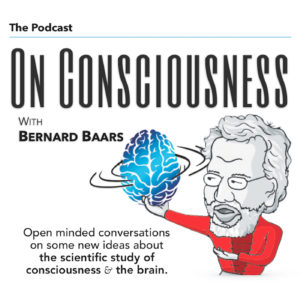FOR IMMEDIATE RELEASE
NEW PODCAST SERIES ON CONSCIOUSNESS WITH BERNARD BAARS. — EPISODE #6 — The Potential of Biologically Inspired Neural Modeling with Neurorobotics Expert Jeffrey Krichmar, a roboticist and computational neuroscientist at the University of California, Irvine
La Jolla, CA, April 2, 2020 – On Consciousness with Bernard Baars is a new bi-weekly podcast featuring open-minded conversations on new ideas about the scientific study of consciousness and the brain. In each episode, author in psychobiology and originator of Global Workspace Theory (GWT), Bernard Baars and co-host David Edelman, a neuroscientist, paleoanthropologist, and Visiting Scholar in the Department of Psychological and Brain Sciences at Dartmouth College are joined by the world’s foremost leaders in biological and cognitive sciences, AI, the arts and humanities to discover the conscious brain.
In this new episode, Baars and Edelman unpack the potential of biologically inspired neural modeling with neurorobotics expert, Jeffrey Krichmar.
Professor in the Department of Cognitive Sciences and the Department of Computer Science at University of California, Irvine, Dr. Jeffrey Krichmar is a former Senior Fellow in Theoretical Neurobiology at The Neurosciences Institute (NSI), founded by Nobel Laureate Gerald M. Edelman.
“Jeff Krichmar’s NSI Darwin robot series provides an excellent set of demonstrations of how the nervous system might perform tasks,” says Bernie Baars, author of On Consciousness: Science & Subjectivity – Updated Works on Global Workspace Theory. “Biological simulations provide us with a ‘proof of principle’ to go back to the laboratory to see if the real brain does things this way.”
Neuroscientist David Edelman concurs. “Observations of novel activity patterns in the simulated nervous systems of brain-based devices can yield clues about otherwise poorly understood aspects of neural function.”
Science is not done by isolated individuals working alone but rather by an “invisible college,” a dynamic network of individuals and groups. Because separate empirical research efforts are adding their own findings every month and year, the body of evidence is also expanding – and the podcast On Consciousness with Bernard Baars broadcasts these exciting empirical findings.
“I always find it fascinating to talk with Bernie and David,” says Jeff Krichmar, Director of the Cognitive Anteater Robotics Laboratory (CARL) at UC Irvine. Their combined breadth and depth of knowledge is amazing. Our conversation ranged from artificial neural networks, to the evolution of Homo sapiens, to animal consciousness, and finally the ethics related to if and when machines become conscious. It was great fun!”
Stream and download On Consciousness with Bernard Baars on your favorite network: PodBean, Stitcher, TuneIn, ApplePodcasts, iHeart, GooglePlay, YouTube, aCast, and Spotify. To learn more and gain access, go to bernardbaars.com/podcast-baars-on-consciousness.
Listen Now on YouTube: The Potential of Biologically Inspired Neural Modeling with Neurorobotics Expert, Jeffrey Krichmar
Download link for PodBean: https://www.podbean.com/media/share/pb-t5pzs-d7ce4a
Watch this BONUS VIDEO: The History of Brain-Based Devices and Cognitive Robots with Neuroroboticist Jeff Krichmar
For media inquiries, please contact our PR Representative Elle Allen: moc.sserpsulituaneht@ellE.

Contact
Elle Allen
The Nautilus Press Publishing Group
moc.sserpsulituaneht@elle
Heather Ashbach
University of California, Irvine

A computational neuroscientist and roboticist, Jeff Krichmar is currently a professor in the Department of Cognitive Sciences and the Department of Computer Science at University of California, Irvine. A Senior Fellow in Theoretical Neurobiology at The Neurosciences Institute from ’99 – ’07, he worked closely with Dr. Gerald M. Edelman.
Jeff’s research interests include neurorobotics, embodied cognition, biologically plausible models of learning and memory, neuromorphic applications and tools, and the effect of neural architecture on neural function.
